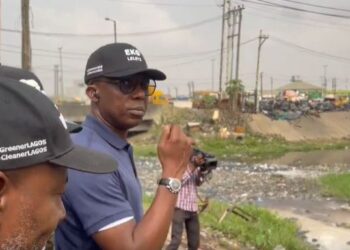The Lagos State Government has ordered the immediate suspension of all land reclamation projects across the state, citing concerns over environmental and social risks.
The announcement was contained in a statement by the Lagos State Commissioner for Environment and Water Resources, Tokunbo Wahab, via his official X account on Thursday.
According to the statement, the suspension applies to all ongoing and planned reclamation activities, whether or not they have obtained Environmental Impact Assessment (EIA) approvals or drainage clearance from the Ministry.
Wahab highlighted that indiscriminate reclamation on wetlands, floodplains, and lagoons—including areas such as Ikoyi, Victoria Island, Lekki, Ajah, Ikorodu, Ojo, and Badagry—has become widespread without proper regulatory oversight.
“The Lagos State Ministry of the Environment and Water Resources (MOE&WR) has observed with grave concern the proliferation of reclamation activities on Wetlands, Floodplains and the Lagoons across the State, particularly around Parkview, Banana Island, Osborne and other parts of Ikoyi, Victoria Island Extension, Lekki, Ajah, Oworonshoki, Lagos Mainland, Ikorodu, Ojo and Badagry axis, without consideration of the adverse Impacts on the Environment and the Wellbeing and Safety of the good people of the State,” the statement read in part.
It added, “Consequently, the Ministry is by this Notice directing all Reclamation Projects across the State with or without EIA approval and Drainage Clearance to be suspended immediately.”
The ministry warned that reclamation projects carried out without approval could increase flooding risks, cause coastal erosion, disrupt livelihoods, reduce biodiversity, and impair water quality.
More insights
While reclamation may create space for housing and infrastructure development, the government said the low-lying topography and fragile ecosystem of Lagos make unregulated reclamation particularly dangerous.
- All approved reclamation projects must now be submitted for proper documentation and monitoring, while ongoing or planned activities must undergo the EIA process and obtain drainage clearance before continuing.
- The ministry gave a seven-day deadline for compliance, after which it said it would deploy machinery to decommission illegal sites, reconnect blocked water channels, and prosecute those involved.
The Lagos State Government emphasized that this directive is part of broader efforts to protect the environment and ensure the safety and wellbeing of residents.
What you should know
The Lagos State Government has intensified efforts to curb developments that could harm the state’s coastal and low-lying areas, which are particularly vulnerable to flooding, erosion, and ecological disruption.
- Unplanned reclamation projects have the potential to block water channels, reduce lagoon capacity, and worsen the impact of seasonal floods.
- For instance, in September 2024, the Lagos State Government sealed Maverick Estate in Gbagada for encroaching on a designated wetland. This action reinforced the government’s commitment to stopping illegal developments in sensitive ecological zones.
These measures demonstrate Lagos State’s continued focus on environmental protection, urban safety, and sustainable development in the face of rapid real estate growth.




















